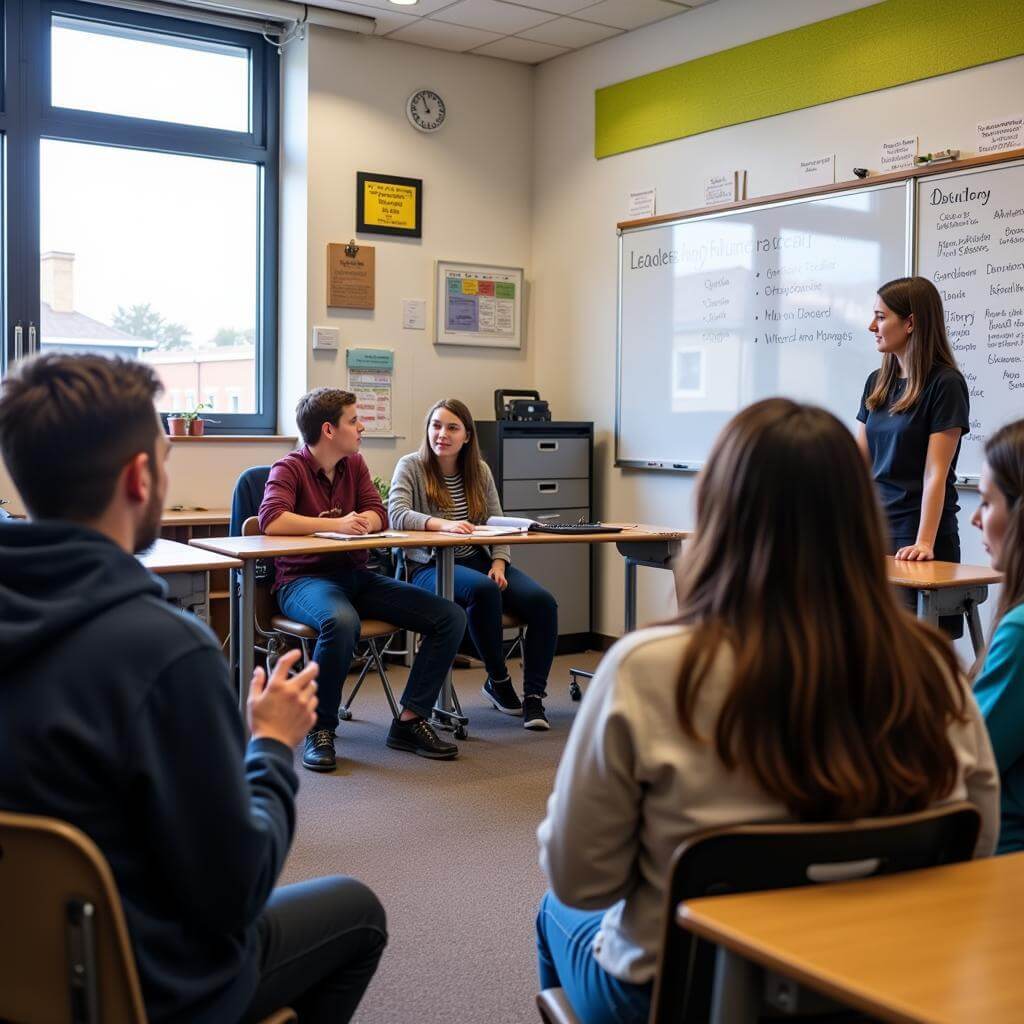Leadership skills are increasingly recognized as crucial for success in both academic and professional settings. As such, the topic of leadership training in schools has become a recurring theme in IELTS Writing Task 2 essays. This article will provide sample essays and in-depth analysis to help you tackle this important subject effectively.
Based on recent IELTS exam trends, we can expect to see questions related to leadership education in schools appearing with moderate frequency. Let’s examine a relevant question that has appeared in past IELTS exams:
Some people think that schools should teach children how to be good members of society. Others believe that school should only teach academic subjects. Discuss both views and give your own opinion.
Analyzing the Question
This question touches on the broader topic of leadership training in schools by asking about teaching children to be good members of society. Let’s break down the key elements:
- Two contrasting views are presented:
- Schools should teach children how to be good members of society
- Schools should focus solely on academic subjects
- You need to discuss both perspectives
- You must also provide your own opinion
Now, let’s look at sample essays for different band scores, starting with a high-scoring response.
Band 8-9 Sample Essay
Education plays a pivotal role in shaping future generations, and there is ongoing debate about what schools should prioritize in their curricula. While some argue that schools should focus exclusively on academic subjects, others believe they have a responsibility to teach children how to be good members of society. In my opinion, a balanced approach that incorporates both academic knowledge and social skills is essential for developing well-rounded individuals.
Those who advocate for a purely academic focus argue that schools have limited time and resources, which should be devoted to core subjects like mathematics, science, and literature. They contend that these subjects provide the foundation for future careers and higher education. Furthermore, they believe that social skills and citizenship are best learned at home or through extracurricular activities.
On the other hand, proponents of teaching social responsibility in schools argue that education should prepare children for all aspects of life, not just academic pursuits. They believe that schools are uniquely positioned to teach children about civic duty, empathy, and cooperation in a diverse environment. Moreover, they argue that these skills are increasingly valued in the workplace and are crucial for addressing complex societal challenges.
In my view, schools should strive to balance academic instruction with lessons on being good members of society. Academic knowledge is undoubtedly important, but it is equally vital to develop social skills, ethical reasoning, and a sense of civic responsibility. By integrating these elements into the curriculum, schools can produce graduates who are not only intellectually capable but also socially conscious and prepared to contribute positively to their communities.
One effective way to achieve this balance is through project-based learning that combines academic subjects with real-world problem-solving. For example, a science project on environmental conservation could incorporate teamwork, community engagement, and ethical decision-making alongside scientific principles. This approach allows students to develop academic knowledge while simultaneously honing their social skills and understanding of civic responsibility.
In conclusion, while academic subjects are undoubtedly important, I believe that schools have a duty to educate children holistically, preparing them to be both knowledgeable and socially responsible adults. By striking a balance between academic rigor and social education, schools can equip students with the diverse skill set they need to thrive in an increasingly complex and interconnected world.
(Word count: 377)
 Students engaged in leadership training classroom discussion
Students engaged in leadership training classroom discussion
Band 6-7 Sample Essay
The role of schools in society is a topic of much debate. Some people think schools should teach children how to be good members of society, while others believe they should focus only on academic subjects. I will discuss both views and give my opinion.
Those who support teaching social skills in schools argue that education should prepare children for all aspects of life. They believe schools can teach important values like respect, cooperation, and civic responsibility. These skills are useful in future jobs and help create a better society. Also, not all children learn these things at home, so schools can fill this gap.
On the other hand, people who think schools should only teach academic subjects have some good points. They say that schools have limited time and resources, which should be used for important subjects like math, science, and languages. These subjects are needed for future studies and careers. They also argue that social skills can be learned outside of school, through family and community activities.
In my opinion, schools should try to do both. Academic knowledge is very important, but being a good member of society is also crucial. I think schools can teach academic subjects while also including lessons on social responsibility. For example, group projects can teach both academic content and teamwork skills. This way, students can learn to be smart and socially responsible at the same time.
To conclude, while academic subjects are essential, I believe schools should also teach children how to be good members of society. By combining both types of education, schools can help create well-rounded individuals who are ready for the challenges of the modern world.
(Word count: 276)
Band 5-6 Sample Essay
Schools are important for children’s education. Some people think schools should teach children to be good members of society. Other people think schools should only teach subjects like math and science. I will talk about both ideas and give my opinion.
People who want schools to teach about being good members of society say it’s important. They think schools can teach children how to be nice to others and help their community. This is good for when children grow up and get jobs. Also, some children don’t learn these things at home, so school can help them.
But other people think schools should only teach subjects like math and science. They say schools don’t have much time, so they should focus on these important subjects. These subjects help children get into university and find good jobs. They also think children can learn about being good people from their family and friends.
I think both ideas are good. Schools should teach subjects like math and science because they are very important. But I also think it’s good to teach children how to be nice and help others. Maybe schools can do both things together. For example, they can have group projects where children learn subjects and also learn to work together.
In conclusion, I think schools should teach academic subjects and also teach children how to be good members of society. This will help children be smart and also be good people when they grow up.
(Word count: 234)
Explanation of Band Scores
Band 8-9 Essay:
This essay demonstrates excellent command of the English language and addresses all parts of the task fully. It presents a clear and well-developed argument, with relevant examples and a logical structure. The vocabulary is sophisticated (e.g., “pivotal role,” “civic duty,” “holistically”) and used accurately. There is a wide range of complex sentence structures, and ideas are cohesively linked. The conclusion effectively summarizes the main points and restates the writer’s opinion.
Band 6-7 Essay:
This essay addresses all parts of the task and presents a clear position. The ideas are relevant and developed, though with less depth and sophistication than the Band 8-9 essay. The vocabulary is appropriate but less varied (e.g., “important,” “useful,” “good points”). Sentence structures are mixed, with some complex sentences, but not as consistently as in the higher band essay. There are some cohesive devices used, but linking could be more flexible. The conclusion summarizes the main points adequately.
Band 5-6 Essay:
This essay addresses the task, but the development of ideas is limited. The structure is simple but clear. Vocabulary is limited and repetitive (e.g., frequent use of “good” and “important”). Sentence structures are mostly simple, with few complex sentences. There is some attempt at cohesion, but it’s often achieved through repetition. The conclusion restates the main points but doesn’t add much depth to the argument.
Key Vocabulary to Remember
- Pivotal (adjective) /ˈpɪv.ə.təl/ – of crucial importance in relation to the development or success of something else
- Curricula (noun) /kəˈrɪk.jə.lə/ – the subjects comprising a course of study in a school or college
- Advocate (verb) /ˈæd.və.keɪt/ – to publicly support or recommend a particular cause or policy
- Civic duty (noun phrase) /ˈsɪv.ɪk ˈdjuː.ti/ – the responsibilities of a citizen
- Holistically (adverb) /həʊˈlɪs.tɪ.kəl.i/ – in a way that considers the whole thing or person rather than just a part
- Rigour (noun) /ˈrɪɡ.ər/ – the quality of being extremely thorough and careful
- Extracurricular (adjective) /ˌek.strə.kəˈrɪk.jə.lər/ – not falling within the scope of a regular curriculum
- Cohesive (adjective) /kəʊˈhiː.sɪv/ – characterized by or causing cohesion
- Sophisticated (adjective) /səˈfɪs.tɪ.keɪ.tɪd/ – having, revealing, or involving a great deal of worldly experience and knowledge of fashion and culture
- Well-rounded (adjective) /ˌwel ˈraʊn.dɪd/ – having a personality that is fully developed in all aspects
Conclusion
The importance of leadership training in schools is a topic that resonates with many aspects of education and society. By examining sample essays at different band levels, we can see how to effectively address this subject in IELTS Writing Task 2. Remember to clearly state your opinion, provide balanced arguments, and use a range of vocabulary and sentence structures appropriate to your level.
For further practice, consider writing essays on related topics such as:
- The role of extracurricular activities in developing leadership skills
- The importance of teaching critical thinking in schools
- Whether schools should focus more on practical life skills or academic knowledge
We encourage you to practice writing your own essay on the topic discussed in this article and share it in the comments section below. This active practice is an excellent way to improve your writing skills and prepare for the IELTS exam.
The importance of developing leadership skills in young learners is a crucial aspect of modern education. By incorporating leadership training into school curricula, we can better prepare students for the challenges they will face in their future careers and personal lives. This approach not only enhances academic performance but also fosters the role of sports in promoting teamwork among students, which is an essential component of effective leadership.
As we consider the future of education and leadership, it’s important to recognize that these skills are not only valuable in academic settings but also in the professional world. For instance, the debate on whether companies should be required to have gender-diverse boards highlights the ongoing need for diverse leadership perspectives in all sectors of society. By nurturing leadership skills early in education, we can contribute to creating more inclusive and effective leadership structures in the future.


